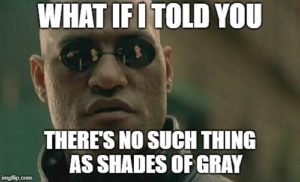First of all, let’s get those quasi-kinky, faux S&M thoughts out of your head . . . this post has nothing to do with the movie.
This is the first part of the Surface Thinkers’ Rx Series, where we challenge our brain machines to look a level deeper. We explore a thing called “critical thinking” where we search for an understanding that lies beyond spoon-fed conclusions.
The term “Shades of Gray” seems like a great place to start — it’s a basic, widespread idea which is easy for our visual brains to latch on to. It’s also completely fucking wrong.
In English, we use the term, “shades of gray” to express an understanding that lies beyond the cold, hard edges of perceived reality. Usually, if someone is said to see the shades of gray it’s a compliment to their superior empathy and perception. I remember in an episode of Ally McBeal, a t.v. series from the late 90’s, the term was used to poetically paint the perceptions of the main character. For those of you who don’t remember, Ally McBeal was a ridiculous woman who let lovesickness dictate her career choices. And yeah, I watched way too many episodes.
But . . . what if . . .
Take, for example, this image of a newspaper image of an orca in the real paper version of The Seattle Times:

What shades would you say made up the whale? Maybe you would say, “black and white”. Orcas are black and white.
But then maybe some ass-licker student raises their hand in class and says, “actually, there are many shades of gray in this picture. The white isn’t actually white if you look closely. It’s gray!”
Well done, Ass-licker!
Actually, sorry Ass-licker, your arrogant notion that you hold a truthier truth than truth — that there is no such thing as black and white — is wrong.
Let’s look closer.

Even closer:

Now we’re close enough to see what every printer already knows.
If you zoom in far enough, you see this image wasn’t printed with black, white, and 20 shades of gray ink. It was printed with varying sizes of black ink dots. There is ink. And there is “not ink”. This image is binary. Yes or no. Right or wrong. At the whitest parts, you can see there is no ink, not a light shade of gray ink that got stamped down.
There is no gray.
So when you’re given a headline, and then you’re fed a different headline with a little extra info that makes you think there may be no right or wrong answer to a problem . . . that is not your cue to say, “well, I guess there are many shades of gray in this world and there is no right answer. Absolute truth is a fallacy.”
No.
That is your cue to think, “well, shit, I guess I need to go a lot deeper down and learn more specific details about this topic to understand it clearly.”
If you see shades of gray, you’re not looking closely enough. Put your swim mask on and dive beneath the surface of understanding. There are really fucking cool tropical fish down there. (And black and white orcas.)






